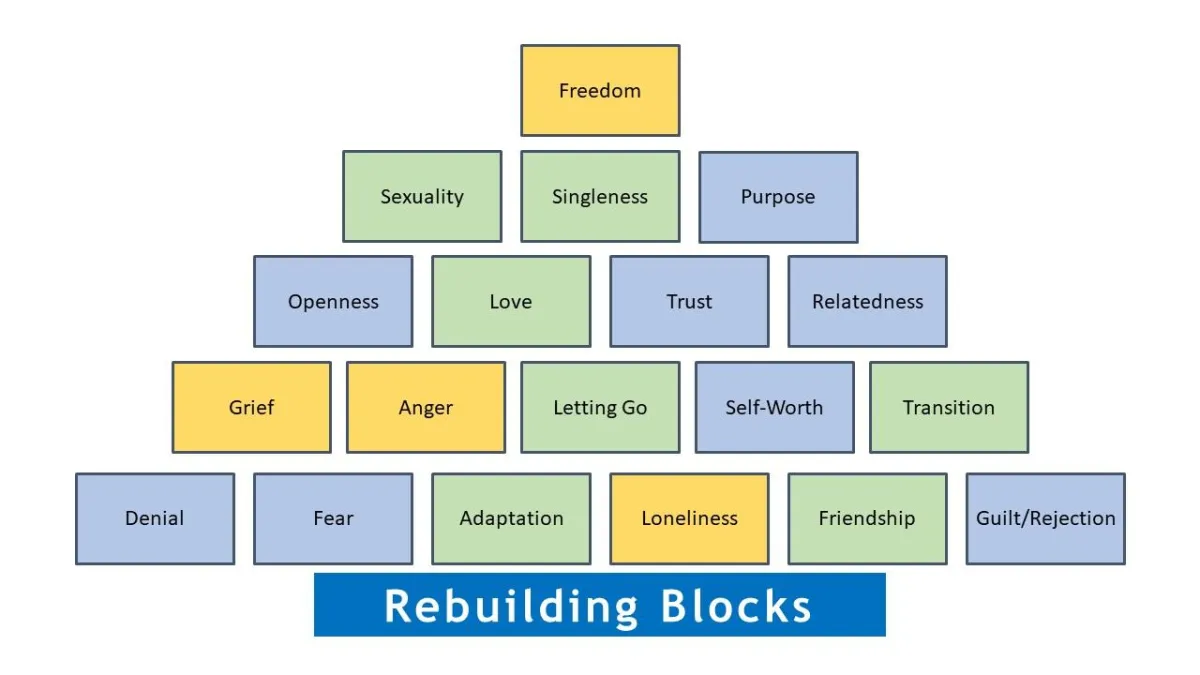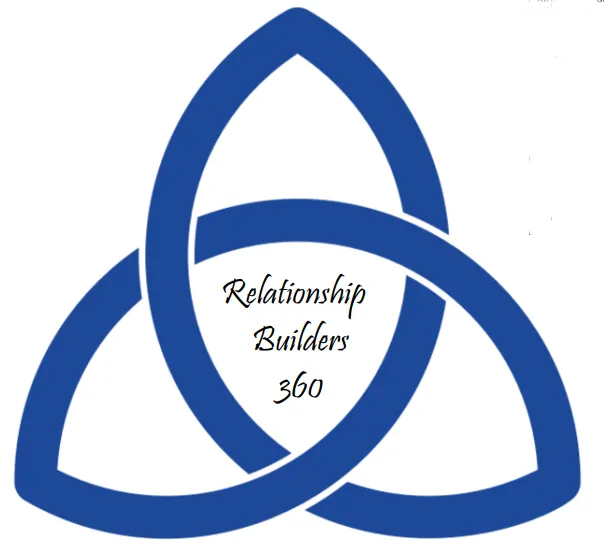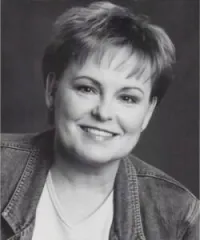The Proven Process
The 4 Stages
The Rebuilding Programs has changed more than 100,000 lives. Now, it's your turn.
The Fisher Rebuilding Seminar was first created in the 1980s by Dr. Bruce Fisher. As he worked privately with people he realized that modern therapeutic methods weren't sufficient. So he began studying the issues to understand what people needed and what information and strategies actually worked.
He eventually simplified the issues in 19 steps for people to work through. Then, he organized them into a logical flow that anyone can follow.
The 19 "Blocks"
Everyone's circumstances of their divorce is unique, but the effects are similar. Dr. Bruce Fisher created a step-by-step structure that walks people through each step or "block". He called this "climbing the mountain". At the top, is freedom. For one person a particular block may take 5 minutes. For another it is "the" block that they are stuck on. By giving you a map and the right guidance from an expert, you are able to rebuild your life, very quickly.

The 4 Phases
The 19 steps can be daunting to people that are overwhelmed. Rest assured that it isn't as hard as it looks. In fact the process can be simplified into 4 major phases.
01
Thinking
Our thoughts can create our suffering. Having the right mindset and learning how to shift your thoughts so that you are the victor, not the victim is life changing. When you are in control you are strong and resilient.
LEARN MORE
02
Feelings
Anger, grief, loneliness, shock, anxiety and more are feelings. Yet most people don't really know WHAT they are feeling, nor how what to do with it. When you allow yourself to turn toward your feelings you are more alive and engaged. What you feel is real!
LEARN MORE
03
Identity
Many people "lose themselves" in their relationships. Then, when the relationship ends they simply don't know who they are. By reconnecting with yourself, maybe for the first time, you become centered and solid. You are authentically you.
LEARN MORE
04
Relationships
The first 3 phases set the foundation for this phase. They are directed inside. The last phase is about your connections with others. You will learn how to build healthy, meaningful and deeply satisfying relationships.
LEARN MORE
WITH THE 10-WEEK GROUP PROGRAM YOU WILL RECEIVE:
30 Hours of Live, In-class Learning
Class Materials: Including a textbook and workbook (over 200 pages of printed information)
Access to a video library so that you can learn and grow on your own schedule as well.
Weekly calls with your peers to give and get support from others also committed to recovery.
Regular social activities outside of class.
2 30-Minute private calls with your facilitator (one at the beginning and one at the end)
Let's Start Rebuilding. Together.
You don't have to do this alone. You aren't the only one going through this. With the right combination of community, coaching, and content you can dramatically rebuild your life. You can be happy and looking forward to the next chapter. How will you Rebuild?
Stay up to date
Ready to continue Rebuilding and Building? Stay up to date on the latest news, articles, and blogs.

Don’t Blink, You’ll Miss It – Health care in a rapidly changing world
Don’t Blink, You’ll Miss It – Health care in a rapidly changing world

“Don’t blink or you’ll miss it!” We city kids always joked about the little towns we’d drive through on our Sunday drives or on the way to summer vacation. Trees, crops, and barns interrupted by a brief braking to pass a bar, church, and post office. That’s how it seems with health care these days. Politics aside (and not discussed here), the delivery and payment for health care is changing so rapidly “don’t blink or you’ll miss it”!
After a change in a significant relationship, you may find yourself navigating the healthcare system one your own for the first time, or at least from a very different perspective. You may have moved away from your former residence, you may now be responsible for finding new healthcare coverage, or even finding a new provider. All of these are much more challenging than they were a year ago.
Before you think about making any changes in coverage, read the plan. Know the plan. Don
’t be afraid to call the plan and ask questions – over and over – until you know what your coverage costs, and the benefits you have. Hospitals, physician groups, and insurers are aligning together in new ways called Accountable Care Organizations. The goals of the ACO’s are to deliver high quality care while saving money through lowered costs. Take a look at this website for more information. The ACO concept has been around for a couple of years, but new strategic alignments are being created all the time, even here in Wisconsin. Make sure you fully understand whether your plan is part of an ACO, and how that ACO affects availability and locations of primary and hospital care.
One of the key factors that your hospital and providers know is a success to their healthcare delivery model is “consumer engagement”. That means that your participation and satisfaction in your own healthcare experience is a primary driver for ACO sustainability. What does all that mean? In short, insurers and providers are spending MORE money than ever to find new ways to effectively educate and communicate with you, the consumer. You are likely to be invited to answer surveys, engage your health record electronically, create and work toward health goals, and do more “home-work” related to any chronic health conditions you may have (like high blood pressure, diabetes, obesity, etc.)
Likely, your outpatient provider and hospital are now offering patient advocacy services. These advocates can help you get resources you need to become more active in your own healthcare. From understanding your bill and insurance benefits to accessing post-discharge assistance, advocates and other professionals are helping consumers in ways that effectively “connect” you and try to make you feel more “in control” of your health. Your hospital or clinic is also engaging social media, like Facebook, or electronic newsletters with advice or news about the latest developments in health care. All of these strategies are designed to achieve a greater and safer patient health outcome.
Health care is changing at an historically accelerated pace – don’t blink!!!
Contact Us
You’ve already come a long way. Let’s reach the next level together.

Email: info@relationshipbuilding360.com
Address:
6402 Odana Rd,
Madison, WI 53719
Phone:
608-204-6076
